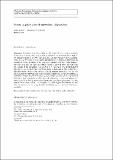Scalar implicatures of embedded disjunction
Author(s)
Crnič, Luka; Chemla, Emmanuel; Fox, Daniel
Download11050_2015_9116_ReferencePDF.pdf (370.9Kb)
OPEN_ACCESS_POLICY
Open Access Policy
Creative Commons Attribution-Noncommercial-Share Alike
Terms of use
Metadata
Show full item recordAbstract
Sentences with disjunction in the scope of a universal quantifier, Every A is P or Q, tend to give rise to distributive inferences that each of the disjuncts holds of at least one individual in the domain of the quantifier, Some A is P & Some A is Q. These inferences are standardly derived as an entailment of the meaning of the sentence together with the scalar implicature that it is not the case that either disjunct holds of every individual in the domain of the quantifier, ¬ Every A is P & ¬ Every A is Q (plain negated inferences). As we show, this derivation faces a challenge in that distributive inferences may obtain in the absence of plain negated inferences. We address this challenge by showing that on particular assumptions about alternatives, a derivation of distributive inferences as scalar implicatures can be maintained without in fact necessitating plain negated inferences. These assumptions accord naturally with the grammatical approach to scalar implicatures. We also present experimental data that suggest that plain negated inferences are not only unnecessary for deriving distributive inferences, but might in fact be unavailable.
Date issued
2015-06Department
Massachusetts Institute of Technology. Department of Linguistics and PhilosophyJournal
Natural Language Semantics
Publisher
Springer Netherlands
Citation
Crnič, Luka, Emmanuel Chemla, and Danny Fox. “Scalar Implicatures of Embedded Disjunction.” Natural Language Semantics 23.4 (2015): 271–305.
Version: Author's final manuscript
ISSN
0925-854X
1572-865X